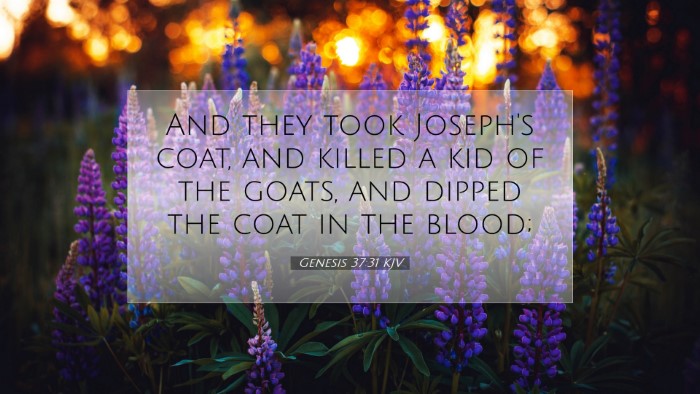Commentary on Genesis 37:31
Verse: "And they took Joseph's coat, and killed a kid of the goats, and dipped the coat in the blood;"
Introduction
This verse is pivotal in the narrative of Joseph and sets the stage for the themes of deception, betrayal, and the unfolding of God’s providential plan. The actions of Joseph's brothers reveal their malicious intent and foreshadow the trials that Joseph will endure. This commentary draws from various public domain sources to provide a comprehensive understanding of this verse.
Contextual Analysis
The events leading up to Genesis 37:31 are critical for understanding the gravity of the actions taken by Joseph's brothers. Having already plotted against Joseph, they utilize the coat, a symbol of their father's favoritism towards Joseph, as a means to enact their deception. The choice to kill a goat and use its blood suggests a deliberate and premeditated act of cruelty.
Insights from Matthew Henry
Matthew Henry emphasizes that the coat of many colors, gifted to Joseph by Jacob, was not merely a piece of clothing but a profound symbol of Jacob’s affection. He notes that this favoritism incited jealousy and hatred among the brothers.
- Symbolism of the Coat: It symbolizes the special status of Joseph, which magnifies the brothers’ resentment.
- The Use of Blood: The act of dipping the coat in goat's blood represents the depth of deceit and foreboding moral corruption.
- Consequences of Sin: Henry points out the psychological burden that sin creates, comparing emotional turmoil to the act of shedding blood.
Insights from Albert Barnes
Albert Barnes elaborates on the significance of the brothers' actions and the implications of their deceit. He notes that the act of killing a goat for blood represents a continued cycle of betrayal and violence.
- Deception as a Theme: Barnes draws attention to the recurring theme of deception in Genesis, showcasing how the brothers’ actions mirror the earlier deceit by Jacob.
- Moral Implications: He reflects on the conscience and moral decay that results from their actions, foreshadowing the eventual repercussions they will face.
- Cultural Practices: Barnes also comments on cultural practices surrounding sacrifices, providing deeper insight into the gravity of their choice.
Insights from Adam Clarke
Adam Clarke provides a detailed exploration of the practical and theological implications inherent in this verse. He highlights the dynamics of familial relationships and their impact on individual destiny.
- Family Dynamics: Clarke remarks that the tensions within families, as seen through the brothers' actions, serve as a cautionary tale.
- The Role of Providence: He suggests that despite the brothers' sinful actions, God's providence will ultimately guide events towards His greater plan.
- Significance of the Goat: Clarke notes the metaphorical use of the goat, which not only serves as a sacrifice but as a representation of guilt and the consequences of sin.
Theological Reflections
This verse not only highlights the brothers' heinous act but also serves as a profound commentary on human nature. The deceitful act can be seen as reflective of humanity's ongoing struggle with jealousy, betrayal, and the violation of familial bonds.
Moreover, the act of shedding innocent blood for personal gain resonates throughout Scripture, pointing towards the ultimate sacrifice of Christ. Just as Joseph was wronged, Jesus was wronged, yet both were pivotal figures in God’s redemptive history.
Practical Applications
The lessons derived from this passage have timeless relevance. Here are several applications:
- Warning Against Jealousy: The destructive consequences of jealousy are evident in the actions of the brothers. This serves as a reminder for individuals to examine their own hearts.
- Integrity in Relationships: The need for integrity and honesty within familial and communal relationships is paramount.
- Understanding Divine Providence: Believers are encouraged to trust in God’s plan even in the face of betrayal and hardship, as He can bring good out of evil.
Conclusion
Genesis 37:31 stands as a sobering reminder of the potential for sin and the consequences that flow from familial discord. The insights from biblical scholars underscore the importance of understanding Scripture in its sociocultural context and realizing the ongoing relevance of these ancient texts in today’s world. They invite pastors, theologians, and scholars alike to engage deeply with the text, fostering a richer comprehension of God's redemptive work through the lens of human failure and divine sovereignty.


